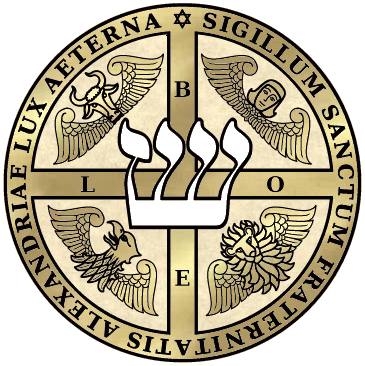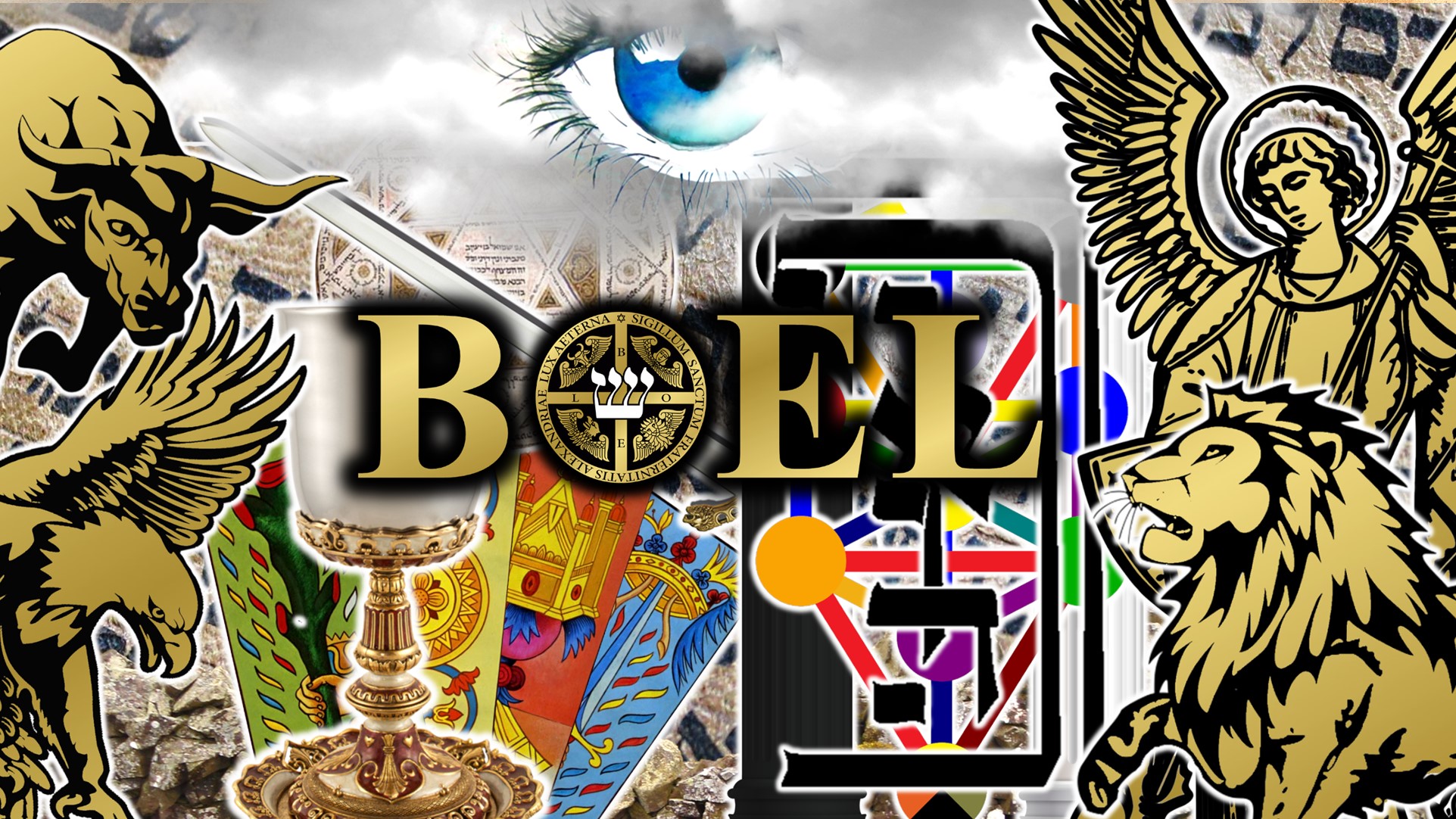© by Salomo Baal-Shem 2008
Serious mystery training must embrace and take into account all parts of the soul. This should not just be theoretical lip service, but should be evident in all aspects of practical work. (For example, in the meditative work with the inner temple, which is the basis of our meditations, each part of the soul corresponds to an area of the temple).
Devotion (or love), wisdom and strength (or power) are the three basic pillars of the magical personality and these should also be the basis of magical training. These three principles correspond to the three main parts of the human soul.
| Basic Pillar of the Magical Personality | Soul Part of Humans | Magical Training |
| Dedication (Love) | Higher Self (Neshamah) | Connection with the Higher, Character Training and Ethics |
| Wisdom | Conscious Self or mental self or mental soul (Ruach) | Achieving deep understanding of the universe and the human soul |
| Power | Lower Self or emotional or unconscious soul(Nefesh) | Development of occult abilities |
Dedication
Devotion corresponds to the occult cardinal virtue of willing, that is, the magical will to serve the Light. The most essential main goal of magical training is to attain the conscious connection with the Higher Self, which in the Qabbalah is called Neshamah and which is our direct link to the divine Original Source. To make this possible, intensive character training is necessary to make our mortal personality a suitable recipient for the higher influences, for we can attract only those forces for which our soul is ready. All great occult teachers have always agreed that the higher powers reveal themselves only to those who have first purified and adequately prepared their souls, therefore character training is a necessary foundation of the occult path. (In traditional texts this point is often described as the “purification from sins”, which in many ancient texts is considered a prerequisite for magical practice. The term “purification from sins” may seem a little outdated to us, but in terms of content it is nothing other than the purification of the soul from its unethical qualities). Ethics is an important part of occult character training, because a person only has a good character if he is also a good person in everyday life and acts ethically. At this point it also becomes clear why sometimes instead of “devotion” we speak of “love” as the first pillar of the magical personality. (The Magician’s Code describes the fundamental principles on which occult ethics are based).
True occult training must show the mystery student ways and means of overcoming his character weaknesses and transforming them into strengths. In the Western Mystery tradition, the Qabbalistic Tree of Life is the foundation and guidepost that shows us the way to attain conscious connection with the higher world. Our devotion must be rekindled and strengthened again and again. (The daily candle exercise is an excellent means of kindling the flame of devotion and keeping it strong). However, it must not remain only with the pious wish that we want to strive for the higher, but this must be an integral part of our occult practice, to which the necessary attention is actually given through profound substantive work. Only in the intensive spiritual work in which the higher principles (for which on the Western Path the Qabbalistic Tree of Life stands) are applied together with practical ethical character training can the alchemical transformation take place through which the ignoble and crude but worthy man becomes a true adept.
Wisdom
Wisdom corresponds to the occult cardinal virtue of knowledge, that is, the attainment of self-knowledge and insight into the nature of all things. Our devotion, that is, our will to serve the highest, must be enlightened by the knowledge of how to achieve this in order to succeed. What good is power without the wisdom to use it wisely? At the level of our conscious self, which in the Qabbalah is called Ruach and which is our mental soul, occult work is primarily concerned with gaining a deep understanding of the universe and the human soul, especially our own soul. The latter is at the core of all self-knowledge and advancement.
In the Western Mystery tradition, an intensive study of the sacred Qabbalah is the most important prerequisite for attaining wisdom. The mystery student, however, does not only need theoretical book knowledge, as is unfortunately all too often the case, but rather the living experience of the Qabbalistic principles, from which true knowledge of the nature of things can develop. (A true mystery student should, however, also be an educated person in worldly matters, who has a comprehensive general knowledge. In addition to occult wisdom, he should also have the necessary knowledge to master his life by worldly means. Spiritual one-sidedness is not a sign of a true mystery student).
Power
Power corresponds to the occult cardinal virtue of daring, that is, the ability to turn the magical will into action through the application of knowledge. The true mystery student should have the occult and worldly abilities to master his spiritual and earthly tasks. Our lower self, which in the Qabbalah is called Nefesh and which is our emotional or unconscious soul, is the true magician within us. Our subconscious can make us sick or healthy, it can bring us happiness or unhappiness in love, work and all situations in life by attracting what is in it. This process usually happens without conscious control. The magician learns through the development of his occult abilities to control the powers of his subconscious and by means of these to contact other powers (e.g. elemental beings, planetary spirits, angels and archangels) and to call them to realise his goals. (This is the reason why the principle of “force” is sometimes called “power”). However, the higher powers will only place themselves at the service of the magician if he knows how to call them and if his soul is filled with devotion to the divine light that all powers serve. (Devotion and wisdom are thus the prerequisites for true magical power).
In the Western Mystery tradition, occult abilities are trained through the use of meditation and ritual. It is important to receive personal guidance and regular assistance from an experienced occultist.
The attainment of these three principles
The fourth occult cardinal virtue of silence corresponds to the realisation of these three principles in the material world under the protective cloak of secrecy (arcane discipline), which protects the Mysteries from profanation by the profane world.
In the community of the occult lodge or brotherhood, the mystery student, hidden and protected from the eyes of the public, receives instruction and support from the individual lodge brothers and sisters as well as from the egregorum, i.e. the group spirit, which is animated by a higher power. Even in his individual work, the Mystery student, through the connection on the inner planes, is supported and encouraged by the Group Spirit, which unites all members of the occult community to which a Mystery student belongs.
The benefit of an occult community to the individual Mystery student is often underestimated by those who have never experienced one, or who have only had the unfortunate experience of having come into a bad or mediocre society. However, it cannot be over-emphasised that it is still far better to belong to no community than to be a member of a bad, dubious or ethically questionable community.
Without devotion we cannot reach the higher world. Without wisdom, our efforts are nothing but aberrations and folly. Without strength we can accomplish nothing. And if we do not realise and integrate these principles in our lives, the results of our occult work will not last. The training of character, the wisdom of life and the personal abilities should also be realised and shown in their effects in the life of the mystery student. No one should claim this for himself if he does not also lead an ethical, balanced and successful life.
Every mystery student should take time now and then to critically examine his own occult training and question whether he has not neglected one aspect or another. Is your spiritual work filled with deep devotion and does it include the intensive ethical character training necessary for the higher work? Is this character training not only theoretically assumed but also integrated into the practical work of your training? Does your occult training include a profound study of the human soul, an earnest pursuit of self-knowledge, and an intensive and living study of cosmic principles and the teachings of the sacred Qabbalah which help you to attain a truly deeper understanding of the nature of things? Does your practical work include effective meditative and ritual techniques that bring you into contact with the higher forces and train you to develop your hidden powers and potentials? And can you realise these contents in a protected framework, in which you, through an experienced teacher (and a brotherly community), experience the necessary encouragement and support, and do you succeed in implementing your occult development in earthly life in such a way that you lead a successful and fulfilled life?
If you have to answer one or more of these questions in the negative, then your occult work is probably missing an important component. Only by giving proper attention to each of these aspects can we become true adepts of the occult path.

